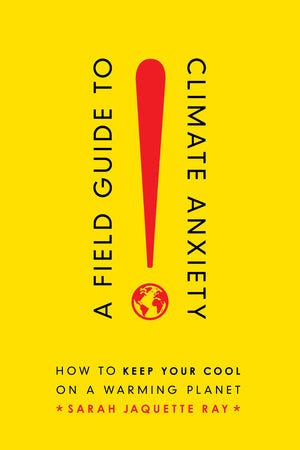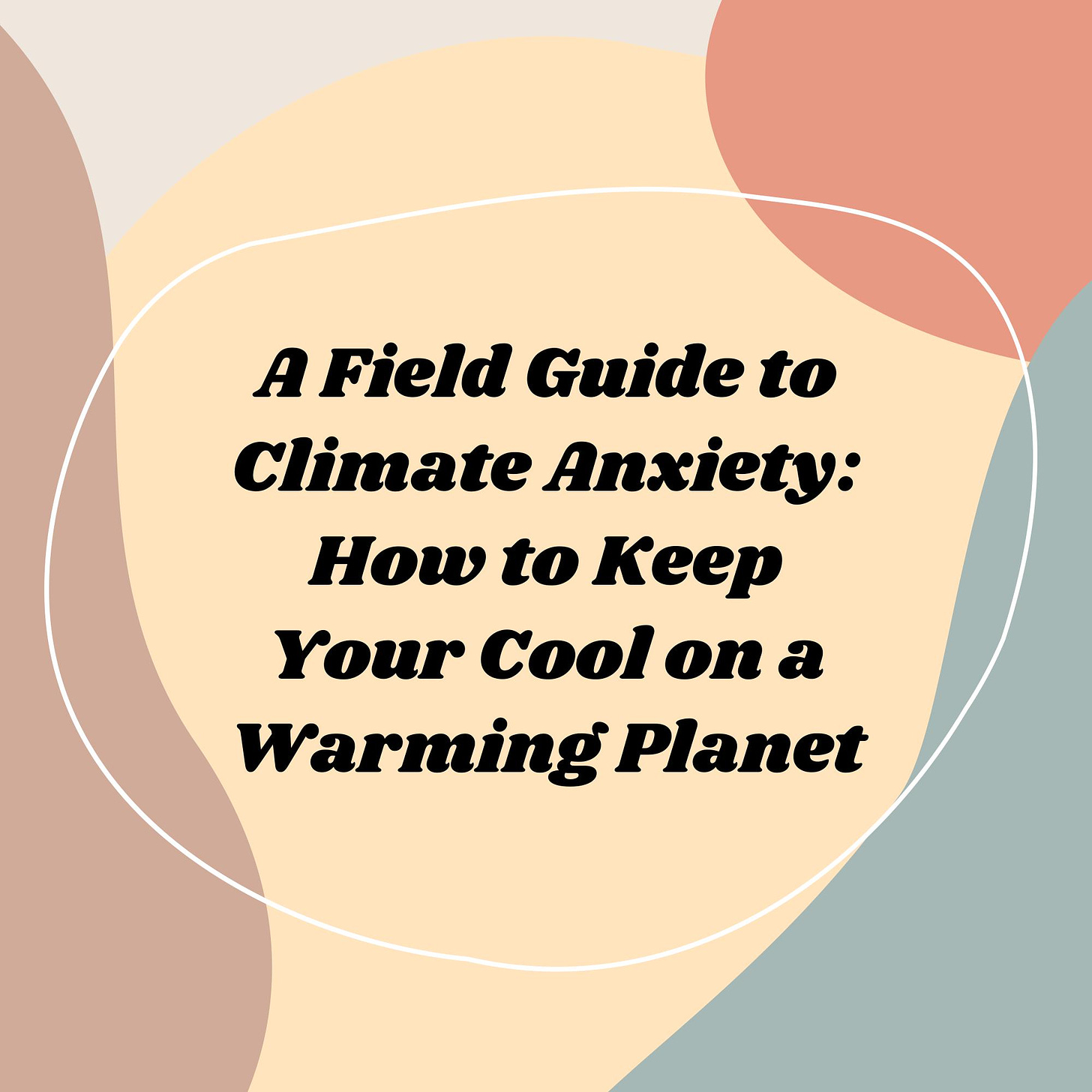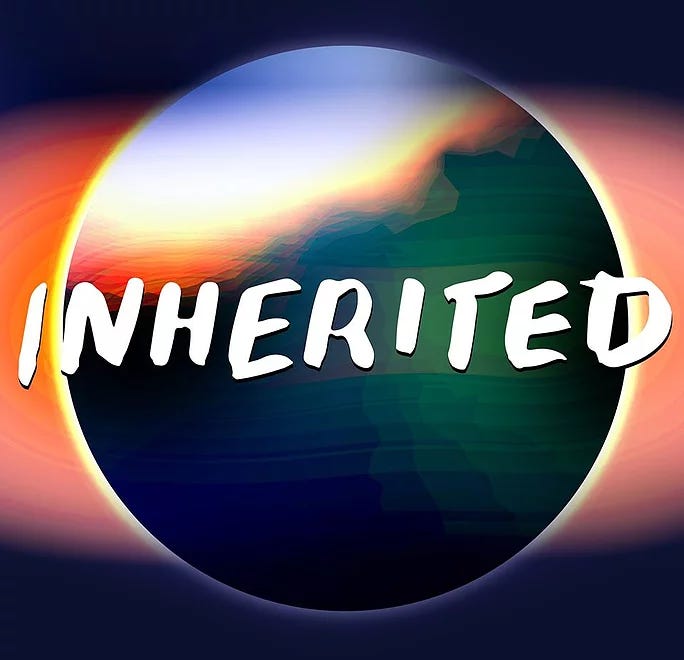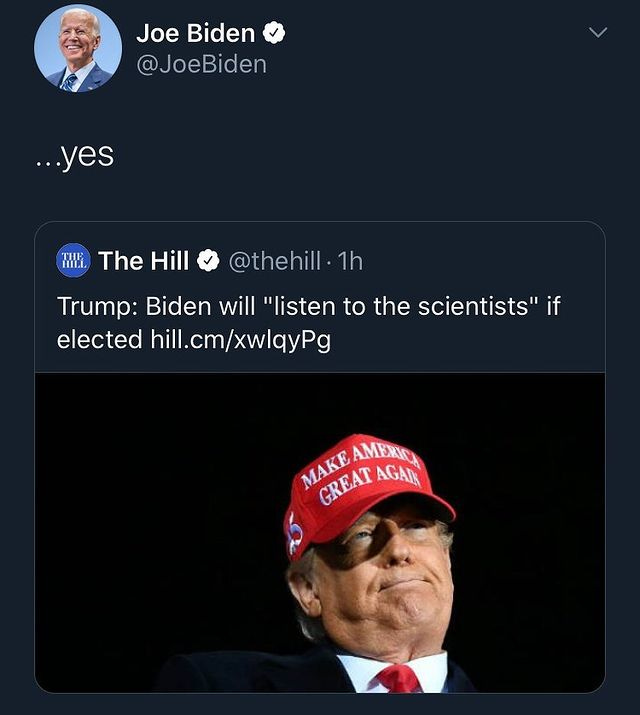A Field Guide to Climate Anxiety
This timely book offers ideas about how to keep your cool on a warming planet
Hey Gen Dread Head! (First time here? Why not sign up for free weekly articles about staying sane in the climate crisis in your inbox!)
This week I want to shed light on a book that is extremely up Gen Dread’s alley and came out in the early days of the pandemic before this newsletter had taken its first dreadful steps. Dr Sarah Jaquette Ray’s A Field Guide to Climate Anxiety is a pioneering book in a genre that offers psychological insights and practical coping skills for eco-emotions - a genre that will no doubt expand in the years to come (I can put money on it since I’m writing one myself).

Ray is a Professor of Environmental Studies at Humboldt State University and she wrote this book for her students: the Gen Z youth so aware of climate disruption and so burnt out on bad news, that their environmental studies classes only traumatize them more. They are, as Ray calls them, the Climate Generation.
One day Ray realized that the education she had long felt it was her job to give students — that of increased environmental awareness and tools to make change — was only making them feel more hopeless and paralysed. Sometimes, they’d hijack her lessons to say things like “Why does this even matter? What are we going to be able to do about this? Nothing.” Or “Why should I go to school when there won’t even be a future with a job for me to work in?” Eventually their despair was starting to burn Ray out herself. Instead of turning away from this difficult work, she used her torment as a probe, and spent the last 4-5 years deeply researching what can be done to nourish burnt out souls - particularly young ones like her students - for the long emergency ahead of doing environmental work.
“Reframing environmentalism as a movement of abundance, connection, and well-being may help us rethink it as a politics of desire rather than a politics of individual sacrifice and denial.” - Sarah Jaquette Ray
The book is highly worth reading, and I encourage anyone who is feeling burnt out, hopeless, despairing, crushed, sick of it all, and even misanthropic to pick it up. You will be rewarded with fresh perspectives about how you can more healthily relate to these feelings, and reframe them for increased motivation and a sense of community throughout.
It includes compelling arguments for why we must ditch guilt, shame, and even empathy (spoiler: the trick is to replace it with compassion). It schools readers on the role of emotions in climate justice work, as well as how to incorporate existential wisdom, spiritualism, and acceptance of the severity of what’s going on into our lives and still find pleasure. It debunks corrosive stories, like the myth of individualism that governs so much in American life, demonstrating how it leads to burnout. Too many activists wear burnout as a badge of honour - as though it proves they’ve accomplished something - and this misguided thinking is diminishing the capacity of collective action itself.
Feed what you want to grow
Ray’s writing teaches us to become more thoughtful about the stories we consume and share, because the difficulty or ease of this work starts there. Crucially, she suggests that “reframing environmentalism as a movement of abundance, connection, and well-being may help us rethink it as a politics of desire rather than a politics of individual sacrifice and denial.” Anger is also explored — an emotion her students (understandably) show a lot. Its importance is recognized but Ray also warns that in the long run, anger will only lead to fraying relationships and isolation, and will therefore destroy us. As I’ve written about before, social capital and connectedness are not just nice to have - they’re need to haves (with scientific backing to prove it) - in order to thrive in dark times.
The book also gets about 100 other sound ideas across, but its overarching message is this: feed what you want to grow. It’s the mantra that helps Ray manage her own anxiety about the world and I must say, when I remember to do this, it certainly helps me too.

The Climate Generation that A Field Guide to Climate Anxiety is intended for encompasses the youth climate movement. This movement proves that the difficult emotions that the climate crisis stirs up don’t only lead to paralysis. They can also be used as fuel for change when they’re nourished in community with the kinds of insights that Ray offers.
So what better book could there be to plug Inherited alongside? Inherited is a podcast that tells stories for, by, and about the youth climate movement. Hosted and produced by Georgia Wright and Julianna Bradley, and brought to you by Critical Frequency, Inherited dives into CLIMATE FEELINGS: the fears, hopes, anxieties, and dreams of a generation under threat, instead of tackling climate stats, data, or reports. Hear from young people who’ve weathered terrifying hurricanes, confronted powerful politicians, grappled with climate anxiety, and dared to dream of a better future. Another world is possible, and Inherited will help you imagine it. Listen to the pilot season now, wherever you get your podcasts. @inheritedpod

Incorporating COVID anxiety
I caught up with Sarah Jaquette Ray last week to ask her what she would have added to A Field Guide to Climate Anxiety had she known that COVID was coming. Her answer was rich and on point. I’ve lightly edited for brevity, but left most of her wisdom here for us all to soak up and I hope, take seriously.
“I'd spell out all the sciences on the connections between pandemics/rise of infectious diseases and climate change. I'd make the case very strongly, right up front and center, that COVID anxiety IS climate anxiety because COVID is Climate change. I'd flesh out my argument thus: psychologists have shown that people will always have a hard time caring about climate change because it doesn't fit well into the schema of risk perception-- that is, it doesn't take the form of any of the things that humans tend to perceive as threats (it doesn't have a scary face, we can't even perceive it with our bodies, etc). Since climate change is doomed as a risk category, and because the work it'll take to deal with it lasts a lot longer and will manifest much later than any political terms, it's been hard to get people and politicians to care about it. So, the only way we can mobilize concern around climate change is through its proxies, like public health threats and extreme weather events. I would make the case that climate change is happening NOW; it is these other things.
I'd talk a lot about how the research on the need for community and social capital that I cite is made so clear by our current moment, ironically when we have to be isolated-- and I'd even say because we have to be isolated, we are learning how much we depend on social structures and human contact. Relatedly the labor that goes into making the economy function is finally being revealed as unacknowledged and undervalued, and it's been illuminating to watch what happens to economic production in the formal sectors when COVID kneecaps social reproduction. This is giving us a path to follow, a guide: we need to invest in a care economy, rethink kinship relations, prioritize community resilience, etc. All things I say in the book but that I'd love to have framed as connected to this crisis.
COVID is creating opportunities-- the"bottleneck" of sorts- that is prompting a reinvention of systems, and this is both scary and necessary. It COULD turn toward more authoritarianism/fear, or it COULD turn toward more democracy, transparency, better institutions, etc. Obviously, I'm working on the latter, but it's an exciting time, and I'd love to have surfaced in my book the possibilities that might emerge in this midst of this grief, chaos, and fear.
The strategies we need for dealing with climate change are the same as those we need to get through COVID, and COVID just drives home the point that we need to be doing these things BEFORE the shit hits the fan so we can hit the ground running and not have to invent resilience for ourselves while under great pressure. The radical imagination-- that instability is an opportunity for massive social change-- needs cultivation prior to any crisis. It's very hard to face these problems while simultaneously developing new habits. Yet, without these habits, the crisis will be ten times harder for us than it could be if we had the habits in place.
Finally, it's not just COVID, it's the rebirth of the movement for racial justice. The connections between COVID, M4BL, and CLIMATE are so important to make, all related to "I can't breathe"-- due to police brutality, environmental racism (as an expression of climate injustice), and the disproportionate vulnerability to COVID (and uneven access to medical care) of people of color-- all point to the same root problem: a system of disposability that benefits a small group of people on the planet. We've never seen a moment so clearly as this one to bring the movements for climate, medical justice, and racial justice together.”
Well said!!!
Found this article useful? Forward it to your friends and family.
Other things from me in the last week
I spoke with Metro about eco-anxiety for their article Here’s what living under the threat of extinction is doing to our brains; shared what keeps me up at night and what gives me hope in ten minutes with The Skylark; and was on the Foreward podcast to discuss science storytelling for today’s crises.
The dread significantly dissipates when we come together!
You can follow me on Instagram, hit me up on Twitter, or reply to this email if you’re already subscribed. If you’re not yet, welcome!
What do you want to see covered in more depth when it comes to the psychological impacts of the climate and wider ecological crisis? Let me know. I love hearing from readers and always find a way to respond.
Have a great week! Here’s a nice thought to help get us through it:





